八年级下册英语unit3一对一讲义汇总
- 格式:doc
- 大小:108.00 KB
- 文档页数:12
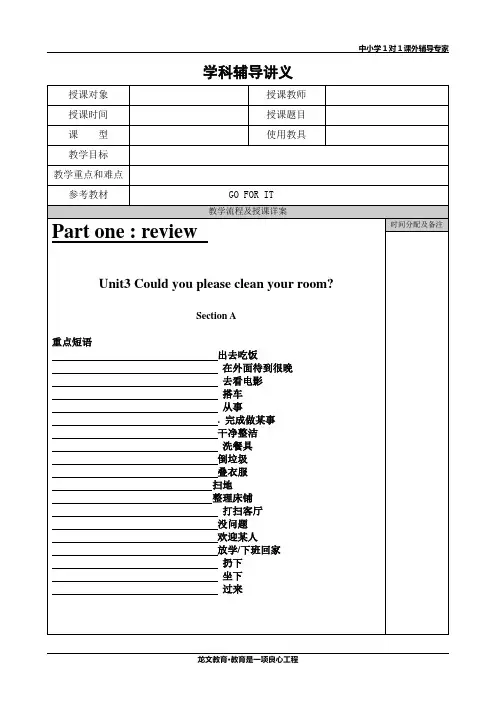
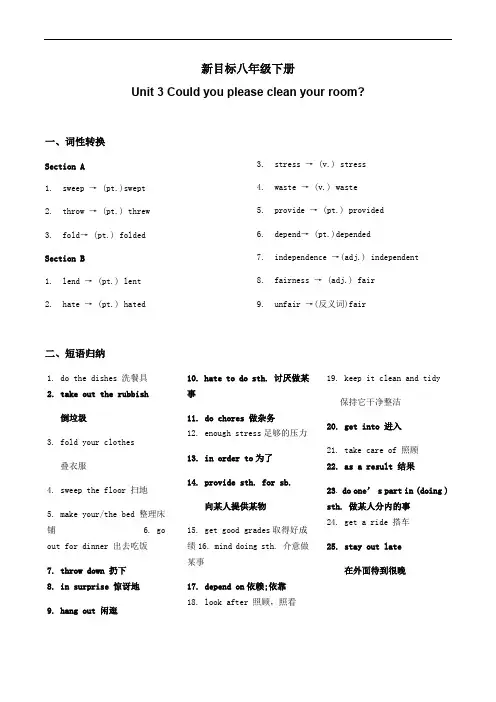
新目标八年级下册Unit 3 Could you please clean your room?一、词性转换Section A1. sweep → (pt.)swept2. throw → (pt.) threw3. fold→ (pt.) folded Section B1. lend → (pt.) lent2. hate → (pt.) hated3. stress → (v.) stress4. waste → (v.) waste5. provide → (pt.) provided6. depend→ (pt.)depended7. independence →(adj.) independent8. fairness → (adj.) fair9. unfair →(反义词)fair二、短语归纳1. do the dishes 洗餐具2. take out the rubbish倒垃圾3. fold your clothes叠衣服4. sweep the floor 扫地5. make your/the bed 整理床铺6. go out for dinner 出去吃饭7. throw down 扔下8.in surprise 惊讶地9. hang out 闲逛10. hate to do sth. 讨厌做某事11. do chores 做杂务12. enough stress足够的压力13. in order to为了14. provide sth. for sb.向某人提供某物15. get good grades取得好成绩16. mind doing sth. 介意做某事17. depend on依赖;依靠18. look after 照顾,照看19. keep it clean and tidy保持它干净整洁20. get into 进入21. take care of 照顾22. as a result 结果23. do one’ s part in (doing )sth. 做某人分内的事24. get a ride 搭车25.stay out late在外面待到很晚三、句型集萃1. Could you please help out with a few things? 你能帮忙做些事情吗?2.Mom will be back from shopping at any minute now. And she won’t be happy if she sees this mess.妈妈现在随时都会购物回来,如果她看到这些一团糟,会不高兴的。
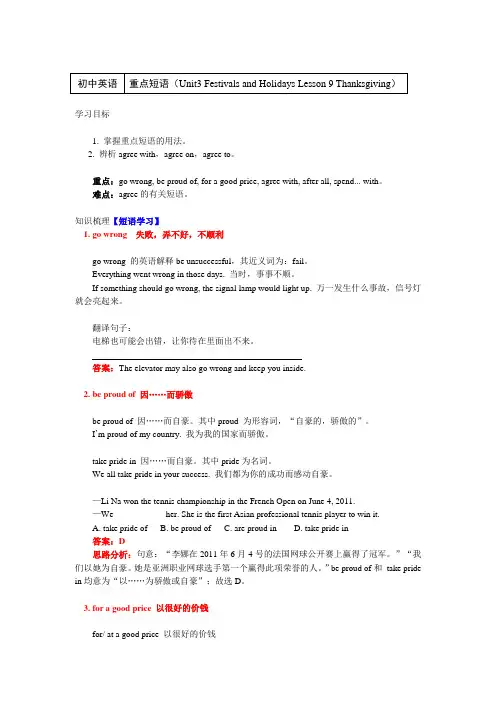
学习目标1. 掌握重点短语的用法。
2. 辨析agree with,agree on,agree to。
重点:go wrong, be proud of, for a good price, agree with, after all, spend... with。
难点:agree的有关短语。
知识梳理【短语学习】1. go wrong 失败,弄不好,不顺利go wrong 的英语解释be unsuccessful,其近义词为:fail。
Everything went wrong in those days. 当时,事事不顺。
If something should go wrong, the signal lamp would light up. 万一发生什么事故,信号灯就会亮起来。
翻译句子:电梯也可能会出错,让你待在里面出不来。
答案:The elevator may also go wrong and keep you inside.2. be proud of 因……而骄傲be proud of 因……而自豪。
其中proud 为形容词,“自豪的,骄傲的”。
I’m proud of my country. 我为我的国家而骄傲。
take pride in 因……而自豪。
其中pride为名词。
We all take pride in your success. 我们都为你的成功而感动自豪。
—Li Na won the tennis championship in the French Open on June 4, 2011.—We ___________ her. She is the first Asian professional tennis player to win it.A. take pride ofB. be proud ofC. are proud inD. take pride in答案:D思路分析:句意:“李娜在2011年6月4号的法国网球公开赛上赢得了冠军。
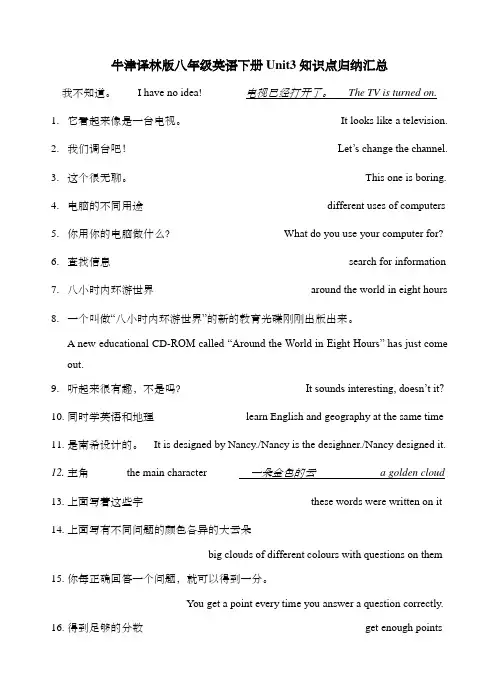
牛津译林版八年级英语下册Unit3知识点归纳汇总我不知道。
I have no idea! 电视已经打开了。
The TV is turned on.1.它看起来像是一台电视。
It looks like a television.2.我们调台吧!Let’s change the channel.3.这个很无聊。
This one is boring.4.电脑的不同用途different uses of computers5.你用你的电脑做什么?What do you use your computer for?6.查找信息search for information7.八小时内环游世界around the world in eight hours8.一个叫做“八小时内环游世界”的新的教育光碟刚刚出版出来。
A new educational CD-ROM called “Around the World in Eight Hours” has just comeout.9.听起来很有趣,不是吗?It sounds interesting, doesn’t it?10.同时学英语和地理learn English and geography at the same time11.是南希设计的。
It is designed by Nancy./Nancy is the desighner./Nancy designed it.12.主角the main character 一朵金色的云 a golden cloud13.上面写着这些字these words were written on it14.上面写有不同问题的颜色各异的大云朵big clouds of different colours with questions on them 15.你每正确回答一个问题,就可以得到一分。
You get a point every time you answer a question correctly.16.得到足够的分数get enough points17.带你去你从来没有去过的地方carry you off to a place you have never visited before18.扮演···的角色play the role of19.如果你聪明,你能在八小时内环游世界。
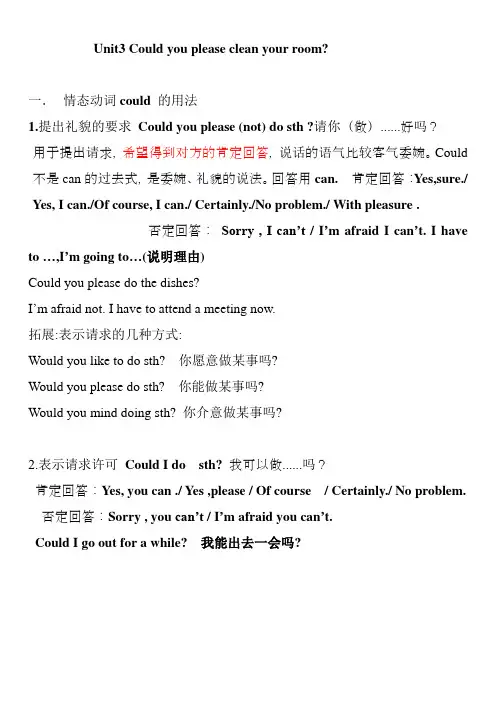
Unit3 Could you please clean your room?一.情态动词could 的用法1.提出礼貌的要求Could you please (not) do sth ?请你(做)......好吗?用于提出请求,希望得到对方的肯定回答,说话的语气比较客气委婉。
Could 不是can的过去式,是委婉、礼貌的说法。
回答用can.肯定回答:Yes,sure./ Yes, I can./Of course, I can./ Certainly./No problem./ With pleasure .否定回答:Sorry , I can’t / I’m afraid I can’t. I have to …,I’m going to…(说明理由)Could you please do the dishes?I’m afraid not. I have to attend a meeting now.拓展:表示请求的几种方式:Would you like to do sth? 你愿意做某事吗?Would you please do sth? 你能做某事吗?Would you mind doing sth? 你介意做某事吗?2.表示请求许可Could I do sth? 我可以做......吗?肯定回答:Yes, you can ./ Yes ,please / Of course / Certainly./ No problem.否定回答:Sorry , you can’t / I’m afraid you can’t.Could I go out for a while? 我能出去一会吗?3.could 为can的过去式,表示过去的能力。
= was / were able toCould you speak English then?那时候你会说英语吗?4.表示推测:(1)后接动词原形,表示对现在或将来的推测(对将来的推测) We could go there this summer.今年夏天我们可能要去那. (对现在的推测) You could be right, but I don’t think you are.你可能是对的,但我并不认为你是对的.(2)后接动词的完成式,表示对过去的推测Where could he have gone? 他能到哪里去了呢?She couldn’t have left so soon.她不可能走这么早.5.表示建议you could…表示建议”你可以…”You could go to the station by subway. 你可以乘地铁去车站.Section A1. take out the rubbish把垃圾带出去. take out 意为”带出去;取出”,为”动副短语”.The dog is noisy. Can you take it out?拓展:take…out of…把…从..中取出I took the money out of my wallet to pay for the breakfast.rubbish: n. 垃圾;废弃物(为不可数名词)a rubbish bin 垃圾桶household rubbish 生活垃圾Don’t throw rubbish everywhere.4. sweep the floor扫地,sweep为及物动词,过去式和过去分词均为swept. He pick up the broom to help me sweep the floor.含sweep的常用短语:Sweep away 消灭;彻底消除Sweep up 打扫;清扫Sweep out 打扫干净;清扫干净Sweep aside 对….置之不理;全然无视5.floor 名词,地板.Why is my coat on the floor?Floor作名词还可意为”楼层”Our office is on the top floor.注意:在英式英语中the ground floor 指第一层,the first floor 指第二层.美式英语中,the first floor指第一层,the second floor 指第二层.9. go to the movies去看电影10. stay out late/ until nine呆到很晚/ 呆到9点钟11. get a ride撘车12. give sb a ride to town开车送某人到镇上13. need to do sth需要做……14. have to do sth不得不做……15. help out with a few things帮助做些事情16. could I at least finish watching this show?可以至少让我看完这个节目吗?at least至少,多指数量或程度上的最低限度。
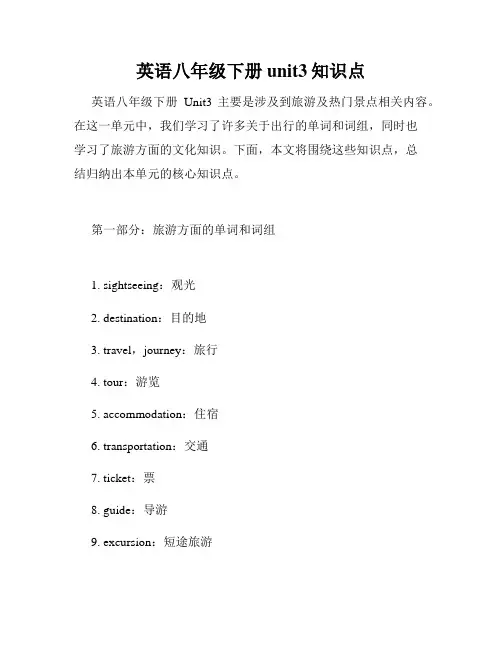
英语八年级下册unit3知识点英语八年级下册Unit3主要是涉及到旅游及热门景点相关内容。
在这一单元中,我们学习了许多关于出行的单词和词组,同时也学习了旅游方面的文化知识。
下面,本文将围绕这些知识点,总结归纳出本单元的核心知识点。
第一部分:旅游方面的单词和词组1. sightseeing:观光2. destination:目的地3. travel,journey:旅行4. tour:游览5. accommodation:住宿6. transportation:交通7. ticket:票8. guide:导游9. excursion:短途旅游我们应该注意这些单词的正确发音和用法,使自己的英语更加准确清晰。
第二部分:旅游方面的文化知识1. 美食文化:在旅游中品尝当地的美食也是很重要的一部分。
比如在中国,烤鸭和火锅就是很受外国人欢迎的美食。
在日本,则是寿司和生鱼片。
2. 交通文化:在不同国家,交通方式也是各不相同的。
比如在欧洲,大多数人选择步行或骑行,而在中国城市,公共交通比较发达,人们通常乘坐地铁、公交车等。
3. 饮食礼仪:在不同国家,饮食礼仪也是有所不同的。
比如在中国,用餐时要招待客人,避免用筷子顶餐盘等等礼仪问题。
在日本,则更注重吃饭时的细节和仪式感。
第三部分:热门景点在这个单元中我们还学习了关于热门景点的话题。
下面介绍一些世界著名热门景点。
1. 埃菲尔铁塔:法国巴黎的标志性建筑。
2. 自由女神像:位于美国纽约港口,是法国人向美国人赠送的礼物。
3. 金门大桥:连接美国旧金山和马林县,是世界上最著名的桥梁之一。
4. 罗马斗兽场:意大利罗马的古代竞技场,是世界历史上最著名的文化遗产之一。
5. 万里长城:中国的镇国之宝,是目前世界上保存最完好、规模最宏大的古代筑墙工程。
总结:英语八年级下册Unit3,主要涉及旅游方面的单词和词组、旅游方面的文化知识和世界著名热门景点。
我们可以通过学习这些知识点,提高我们的英语交流能力,也可以更好地了解和欣赏不同国家的风土人情。
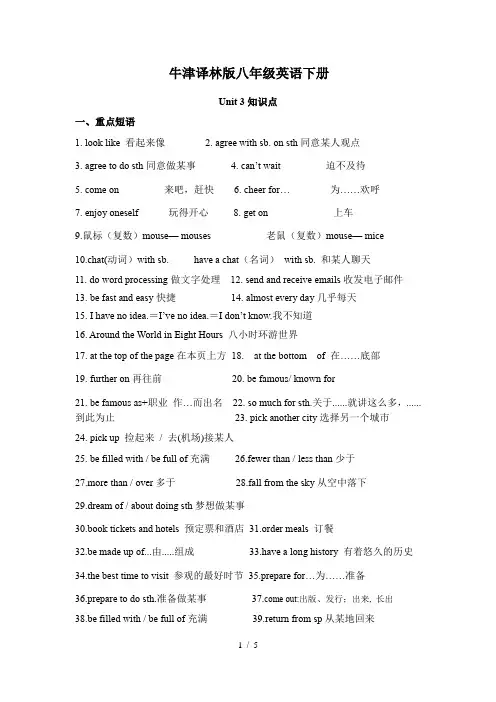
牛津译林版八年级英语下册Unit 3知识点一、重点短语1. look like 看起来像2. agree with sb. on sth同意某人观点3. agree to do sth同意做某事4. can’t wait 迫不及待5. come on 来吧,赶快6. cheer for… 为……欢呼7. enjoy oneself 玩得开心8. get on 上车9.鼠标(复数)mouse— mouses 老鼠(复数)mouse— mice10.chat(动词)with sb. have a chat(名词)with sb. 和某人聊天11. do word processing做文字处理12. send and receive emails收发电子邮件13. be fast and easy快捷14. almost every day几乎每天15. I have no idea.=I’ve no idea.=I don’t know.我不知道16. Around the World in Eight Hours 八小时环游世界17. at the top of the page在本页上方18. at the bottom of 在……底部19. further on再往前20. be famous/ known for21. be famous as+职业作…而出名22. so much for sth.关于......就讲这么多,......到此为止23. pick another city选择另一个城市24. pick up 捡起来/ 去(机场)接某人25. be filled with / be full of充满26.fewer than / less than少于27.more than / over多于28.fall from the sky从空中落下29.dream of / about doing sth梦想做某事30.book tickets and hotels 预定票和酒店31.order meals 订餐32.be made up of...由.....组成33.have a long history 有着悠久的历史34.the best time to visit 参观的最好时节35.prepare for…为……准备36.prepare to do sth.准备做某事e out:出版、发行;出来, 长出38.be filled with / be full of充满39.return from sp从某地回来40. return to sp 回到某地二、词汇梳理1. look like 看起来像(指长相,即可指人也可指物)What do/does sb. look like? 问长相=How do/does sb. look?What be sb. like? 问品质What do/does sb. like? 问喜好2.send and receive emails收发电子邮件(1) send 发送send sb. sth.=send sth. to sb.把某物寄给/送给某人(2) receive 收到,接到receive emails 接收邮件区分:receive 与accept receive 客观(被动地)收到accept 主观接受eg. I received a bunch of flower, but I didn't accept it.3. use sth… to do/ use sth. for sth. 用……做……4. turn on the TV →turn on/off打开/关闭…,turn up/down调大/调低;都是“动词+副词”。
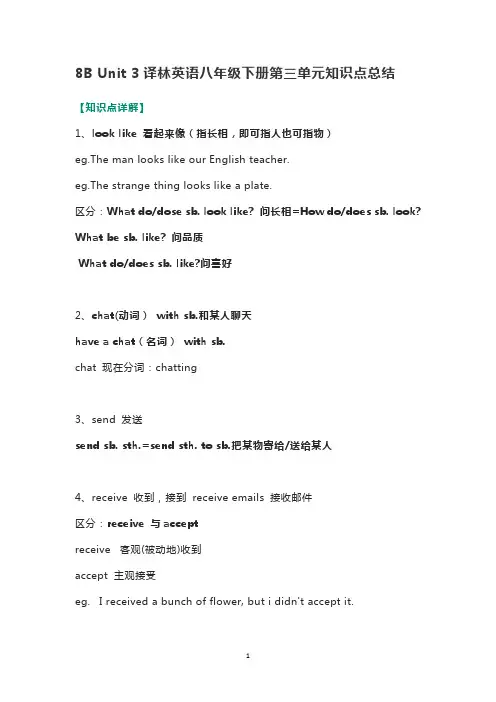
8B Unit 3译林英语八年级下册第三单元知识点总结【知识点详解】1、look like 看起来像(指长相,即可指人也可指物)eg.The man looks like our English teacher.eg.The strange thing looks like a plate.区分:What do/dose sb. look like? 问长相=How do/does sb. look? What be sb. like? 问品质What do/does sb. like?问喜好2、chat(动词)with sb.和某人聊天have a chat(名词)with sb.chat 现在分词:chatting3、send 发送send sb. sth.=send sth. to sb.把某物寄给/送给某人4、receive 收到,接到receive emails 接收邮件区分:receive 与acceptreceive 客观(被动地)收到accept 主观接受eg. I received a bunch of flower, but i didn't accept it.5、what...for?......为何目的,为何理由?=Why?eg. What did you do that for?=Why did you do that?6.click 点击 click(及物动词)sth. =click(不及物动词) on sth. 点击7.thousands of 数以千计的hundred,thousand,million等表示确指时(前面有具体的数字),用单数;表泛指(前面没有数字)用复数,其后加ofeg. hundreds of8.see sb. doing sth.看见某人正在做某事eg. When i passed by the KFC, I saw many children eating hamburgers and chips in it.see sb. do sth.看见某人做了某事(强调动作发生的全过程)9.huge 形容词:巨大的区分:huge,big 和largehuge强调体型而不是重量,big指具体事物,多指体积大,还可以表示“巨大的,伟大的,重要的”等意思,其反义词是little或small,large多指面积之大、人口之多,也可表示数量(the number).10. relax 放松,休息动词三单:relaxes形容词:relaxed修饰人relaxing修饰物11. be famous for +表示人或物某方面的特点、特长的词因......而出名=be known forbe famous as +职位/名称作为......而出名be famous to sb. 对于......很出名,被......所熟知eg. He is famous to the people all over the world. 他被全世界的人所熟知。
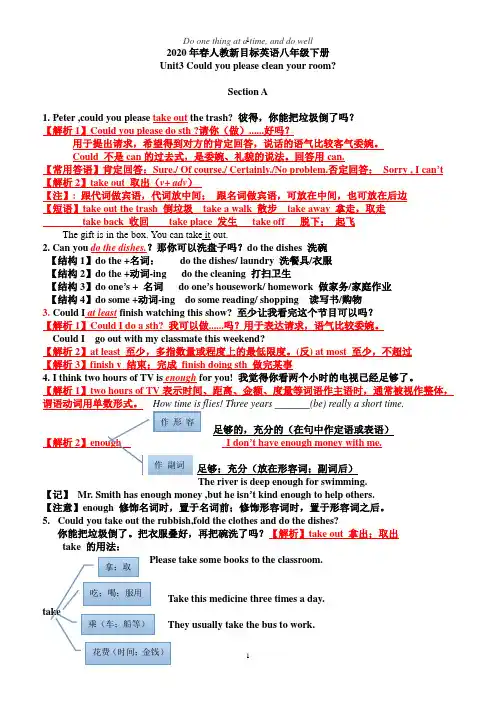
2020年春人教新目标英语八年级下册Unit3 Could you please clean your room?Section A1.Peter ,could you please take out the trash? 彼得,你能把垃圾倒了吗?【解析1】Could you please do sth ?请你(做)......好吗?用于提出请求,希望得到对方的肯定回答,说话的语气比较客气委婉。
Could 不是can的过去式,是委婉、礼貌的说法。
回答用can.【常用答语】肯定回答:Sure./ Of course./ Certainly./No problem.否定回答:Sorry , I can’t 【解析2】take out 取出(v+ adv)【注】: 跟代词做宾语,代词放中间;跟名词做宾语,可放在中间,也可放在后边【短语】take out the trash 倒垃圾take a walk 散步take away 拿走,取走take back 收回take place 发生take off 脱下;起飞The gift is in the box. You can take it out.2. Can you do the dishes.?那你可以洗盘子吗?do the dishes 洗碗【结构1】do the +名词:do the dishes/ laundry 洗餐具/衣服【结构2】do the +动词-ing do the cleaning 打扫卫生【结构3】do one’s + 名词do one’s housework/ homework 做家务/家庭作业【结构4】do some +动词-ing do some reading/ shopping 读写书/购物3.Could I at least finish watching this show? 至少让我看完这个节目可以吗?【解析1】Could I do a sth? 我可以做......吗?用于表达请求,语气比较委婉。
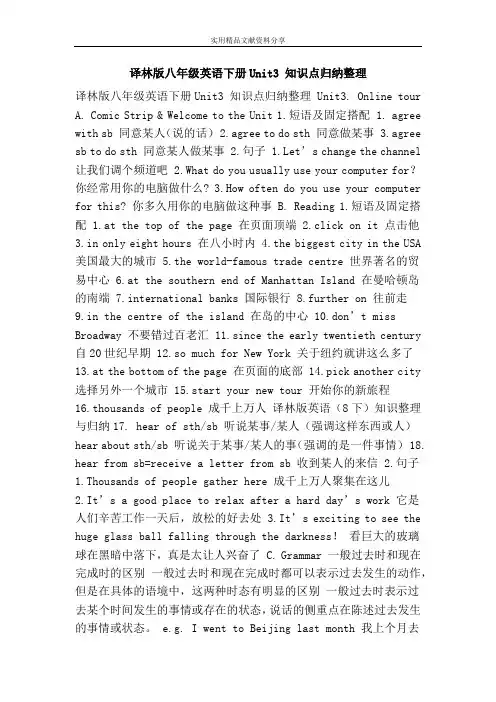
译林版八年级英语下册Unit3 知识点归纳整理译林版八年级英语下册Unit3 知识点归纳整理 Unit3. Online tour A. Comic Strip & Welcome to the Unit 1.短语及固定搭配 1. agree with sb 同意某人(说的话) 2.agree to do sth 同意做某事 3.agree sb to do sth 同意某人做某事 2.句子1.Let’s change the channel 让我们调个频道吧 2.What do you usually use your computer for?你经常用你的电脑做什么? 3.How often do you use your computer for this? 你多久用你的电脑做这种事 B. Reading 1.短语及固定搭配 1.at the top of the page 在页面顶端 2.click on it 点击他3.in only eight hours 在八小时内 4.the biggest city in the USA 美国最大的城市 5.the world-famous trade centre 世界著名的贸易中心 6.at the southern end of Manhattan Island 在曼哈顿岛的南端 7.international banks 国际银行 8.further on 往前走9.in the centre of the island 在岛的中心10.don’t miss Broadway 不要错过百老汇 11.since the early twentieth century 自20世纪早期 12.so much for New York 关于纽约就讲这么多了13.at the bottom of the page 在页面的底部 14.pick another city 选择另外一个城市 15.start your new tour 开始你的新旅程16.thousands of people 成千上万人译林版英语(8下)知识整理与归纳17. hear of sth/sb 听说某事/某人(强调这样东西或人)hear about sth/sb 听说关于某事/某人的事(强调的是一件事情) 18. hear from sb=receive a letter from sb 收到某人的来信 2.句子1.Thousands of people gather here 成千上万人聚集在这儿2.It’s a good place to relax after a hard day’s work 它是人们辛苦工作一天后,放松的好去处 3.It’s exciting to see the huge glass ball falling through the darkness!看巨大的玻璃球在黑暗中落下,真是太让人兴奋了 C. Grammar 一般过去时和现在完成时的区别一般过去时和现在完成时都可以表示过去发生的动作,但是在具体的语境中,这两种时态有明显的区别一般过去时表示过去某个时间发生的事情或存在的状态,说话的侧重点在陈述过去发生的事情或状态。
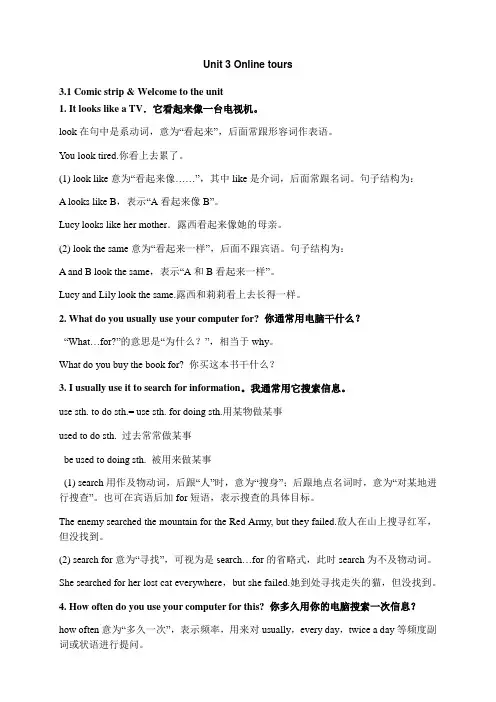
Unit 3 Online tours3.1 Comic strip & Welcome to the unit1. It looks like a TV.它看起来像一台电视机。
look在句中是系动词,意为“看起来”,后面常跟形容词作表语。
You look tired.你看上去累了。
(1) look like意为“看起来像……”,其中like是介词,后面常跟名词。
句子结构为:A looks like B,表示“A看起来像B”。
Lucy looks like her mother.露西看起来像她的母亲。
(2) look the same意为“看起来一样”,后面不跟宾语。
句子结构为:A andB look the same,表示“A和B看起来一样”。
Lucy and Lily look the same.露西和莉莉看上去长得一样。
2. What do you usually use your computer for? 你通常用电脑干什么?“What…for?”的意思是“为什么?”,相当于why。
What do you buy the book for? 你买这本书干什么?3. I usually use it to search for information。
我通常用它搜索信息。
use sth. to do sth.= use sth. for doing sth.用某物做某事used to do sth. 过去常常做某事be used to doing sth. 被用来做某事(1) search用作及物动词,后跟“人”时,意为“搜身”;后跟地点名词时,意为“对某地进行搜查”。
也可在宾语后加for短语,表示搜查的具体目标。
The enemy searched the mountain for the Red Army, but they failed.敌人在山上搜寻红军,但没找到。
(2) search for意为“寻找”,可视为是search…for的省略式,此时search为不及物动词。
人教版丨初中英语八年级下册Unit 3知识点精析(下)+课文注释1.invite my friends to a party邀请我的朋友们来参加聚会要点精析invite为及物动词,意为“邀请”。
invite sb.to do sth.意为“邀请某人做某事”。
例:We invited all our friends.我们邀请了我们所有的朋友。
Kate invited me to go to the movies with her.凯特邀请我和她一起去看电影。
知识拓展invite 的名词形式为invitation,意为“邀请;请帖”。
例:Thank you for your kind invitation.谢谢你的盛情邀请。
2. I do not understand why some parents make their kids help with housework and chores at home.我不理解为什么一些父母让他们的孩子在家帮忙做家务。
要点精析make their kids help with housework and chores 是 make sb. do sth.结构,此结构意为“让/使某人做某事”。
例:This good news made her laugh happily.这个好消息使她开心地笑了。
3.Housework is a waste of their time.(做)家务是浪费他们的时间。
要点精析a waste of...意为“浪费……”,其中waste是名词,意为“浪费;滥用”。
例:Playing computer games is a waste of time.玩电脑游戏是浪费时间的。
知识拓展waste还可作动词,意为“浪费”。
例:Don't waste your money on clothes.别把你的钱浪费在衣服上。
4. They should spend their time on schoolwork in order to get good grades and get into a good university.为了取得好成绩,进入一所好大学,他们应该把他们的时间花在学业上。
Unit3 Could you please clean your room?重点知识归纳一、短语归纳1.go out for dinner 出去吃饭2.stay out late 在外面待到很晚3.go to the movies 去看电影4.get a ride 搭车5.work on 从事6.finish doing sth. 完成做某事7.clean and tidy 干净整洁的8.do the dishes 洗餐具9.take out the rubbish 倒垃圾10.fold your/the clothes 叠衣服11.sweep the floor 扫地12.make your/the bed 整理床铺13.clean the living room 打扫客厅14.no problem 没问题15.welcome sb. 欢迎某人e home from school/work放学/下班回家17.throw down 扔下18.sit down 坐下e over 过来20.take sb. for a walk 带某人去散步21.all the time 一直;总是22.all day/evening 整日/夜23.do housework 做家务24.shout back 大声回应25.walk away 走开26.share the housework 分担家务27.a comfortable home 一个舒适的家28.in surprise 惊讶地29.get something to drink 拿点喝的东西30.watch one show 观看一个节目31.hang out 闲逛32.pass sb. sth. 把某物传给某人33.lend sb. sth. 把某物借给某人34.get sth. wet 使某物弄湿35. hate to do sth. 讨厌做某事36.do chores 做杂务37.help sb. (to ) do /with sth.帮助某人干某事38.bring a tent带顶帐篷来39.buy some snacks买些小吃40.go to the store去商店41.invite sb. to a party邀请某人参加聚会42.make sb. do sth. 使某人做某事43.enough stress足够的压力44.a waste of time浪费时间45.in order to为了46.get good grades取得好成绩47.mind doing sth. 介意做某事48.depend on依赖;依靠49.develop children ’ s independence发展孩子的独立性50.look after/take care of 照顾;照看51.do one’ s part in (doing ) sth. 尽某人的职责二、用法归纳1.finish doing sth. 做完某事2.want sb. to do sth. 想要某人做某事3.try (not) to do sth. 尽力(不)做某事4.let sb. do sth. 让某人做某事5.spend......(in) doing sth. 花费......做某事6.mind doing sth. 介意做某事7.learn to do sth. 学习做某事8.learn how to do sth. 学习怎样做某事9.The +比较级,the+比较级越......,就越.....三、词句精讲1.Could you please take out the rubbish? 你能把垃圾倒了吗?Could you please do sth ?请你(做)......好吗?用于提出请求,希望得到对方的肯定回答,说话的语气比较客气委婉。
八年级下册人教版英语unit3知识点Unit 3 Topic1-21. 询问及回答情感表达- What's the matter? / What's wrong?- What happened?- Are you all right?- I'm sorry to hear that.- That's too bad.- Congratulations!- Great! / Excellent! / Fantastic!2. 询问及回答感官描述- What does it look / sound / smell / taste / feel like?- It looks / sounds / smells / tastes / feels…3. 询问及回答意图- Why did you…?- What are you going to …?- What do you intend to…?- I intend to… / I plan to…4. 问路及指路,口语表达中熟悉的方向词汇- Excuse me, could you tell me the way to…?- How can I get to…?- The nearest bus stop / subway station / bank / post office is… - It's on the left / right / opposite…Unit 3 Topic 3-41. 表达偏好及兴趣- Would you like…?- What kind of…do you like?- Do you prefer…to…?- I'm into…- I'm fond of…- I enjoy…2. 指出和辨认物品及人物(描述外貌和服装)- What does he / she look like?- He / She has…(描述头发颜色、眼睛、身材特征、穿戴等)3. 询问及描述活动安排- What are you going to do…?- What will you do…?- I'll…4. 描述天气- What's the weather like today?- It's sunny / cloudy / rainy / snowy / windy…- It's hot / warm / cool / cold…Unit 3 Topic 5-61. 表示和理解时间和星期- What time is it?- What's the date today?- What day is it today?- How many days are there in a week?- What do you usually do on weekends?2. 描述行程及活动- Tomorrow, I'm going to…(描述行程)- On Monday / Tuesday / Wednesday…, I usually… - In the morning / afternoon / evening / at night…, I…3. 询问及回答感受- How do you feel?- I feel…(描述感受)4. 描述位置- Where is the…? It's…(描述方位)以上是八年级下册人教版英语unit3的知识点总结,有效巩固这些知识点,可以让你在英语学习中更加得心应手。
八下英语第三单元知识梳理以下是八下英语第三单元的知识梳理:一、重点短语:take a photo 拍照in the corner 在角落里on the right 在右边on the left 在左边in front of 在……前面behind 在后面next to 紧挨着turn left/right 左转/右转go straight 直走cross the road 穿过马路wait for a while 等一会儿look for a while 看一会儿二、重点句型:1、Excuse me, where is the nearest post office? 请问,最近的邮局在哪里?2、Could you tell me the way to the train station? 你能告诉我去火车站的路吗?3、Go along the street and turn left at the first crossing. 沿着这条街走,在第一个十字路口左转。
4、It's next to the bank. 它挨着银行。
三、重点语法:1、问路和指路的表达方式。
例如:where is the nearest post office? how can I get to the train station?等等。
2、表示位置的介词,如:in, on, next to, behind, in front of等等。
四、重点单词:这个单元的单词包括各种地点名词,如bank,post office,library,train station等等,以及表示位置和方向的介词和短语。
八年级初二英语unit3知识点八年级初二英语Unit 3知识点
Unit 3是八年级初二英语课程中的一个重要部分,它包含了许多必须掌握的知识点。
以下是Unit 3中的主要知识点:
一、词汇
本单元的词汇是学生需要重点掌握的。
包括名词,动词,形容词和副词等各种类型的单词。
这些单词可以通过做语法练习来巩固记忆。
二、时态
本单元主要介绍了一些简单的时态,包括现在时,过去时和将来时等。
在英语语法中,时态是非常重要的,因此学生必须掌握这部分内容。
三、句型
本单元主要介绍了一些基本的英语句型,例如祈使句,疑问句等。
学生需要掌握这些句型,并且在实际使用中熟练运用。
四、语法
本单元主要介绍了几种基本的语法规则,包括名词性从句,简单句,复合句等。
语法规则是英语学习的重点,因此学生需要认真学习这部分内容。
五、阅读
阅读是学习任何语言都必须掌握的技能之一。
本单元提供了一些适合初学者阅读的材料,学生需要通过阅读来提高自己的英语水平。
六、写作
本单元还包括一些写作练习,例如写作话题和写作明信片等。
这些练习是帮助学生提高编写英语文章的能力,并通过书写来加深对词汇和语法的理解。
综上所述,Unit 3是八年级初二英语学习的重要部分,它包含了许多必须掌握的知识点。
学生需要耐心学习并反复练习,以便更好地掌握这些知识点并提高自己的英语水平。